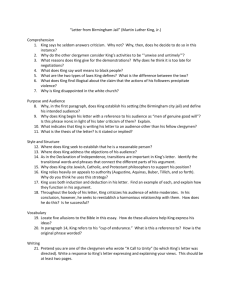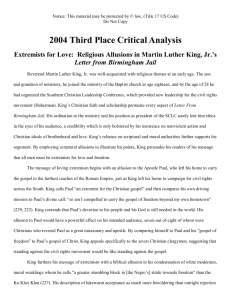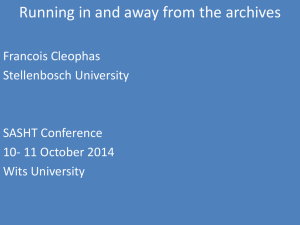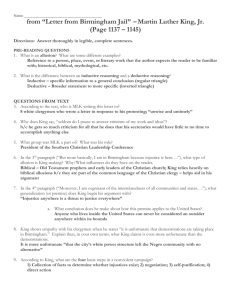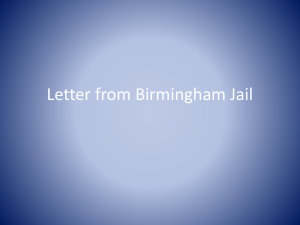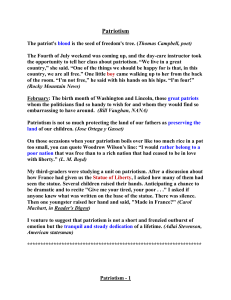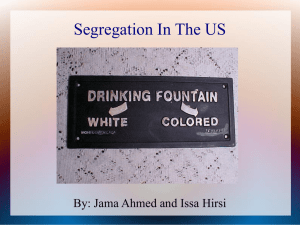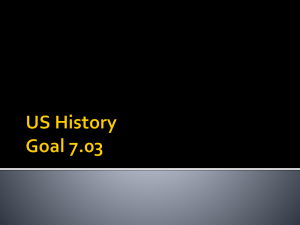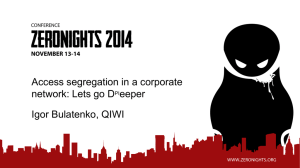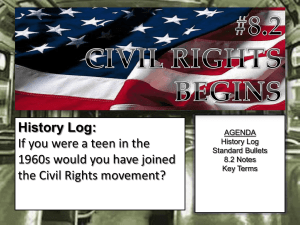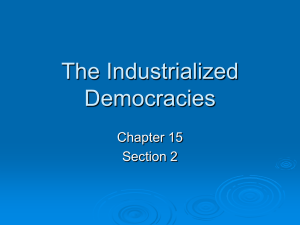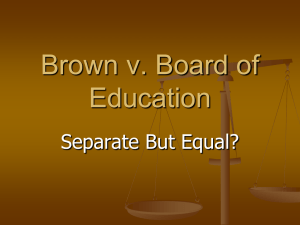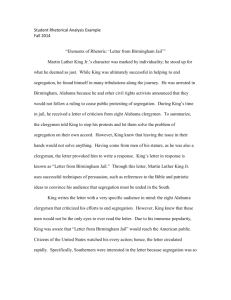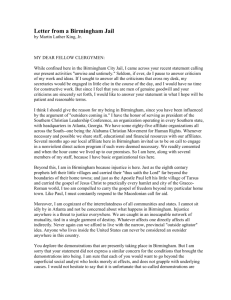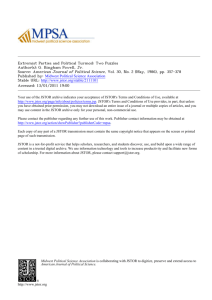Marcus Jones AP English Mr. Oakes 10/3/10 Marcus The Upside of
advertisement
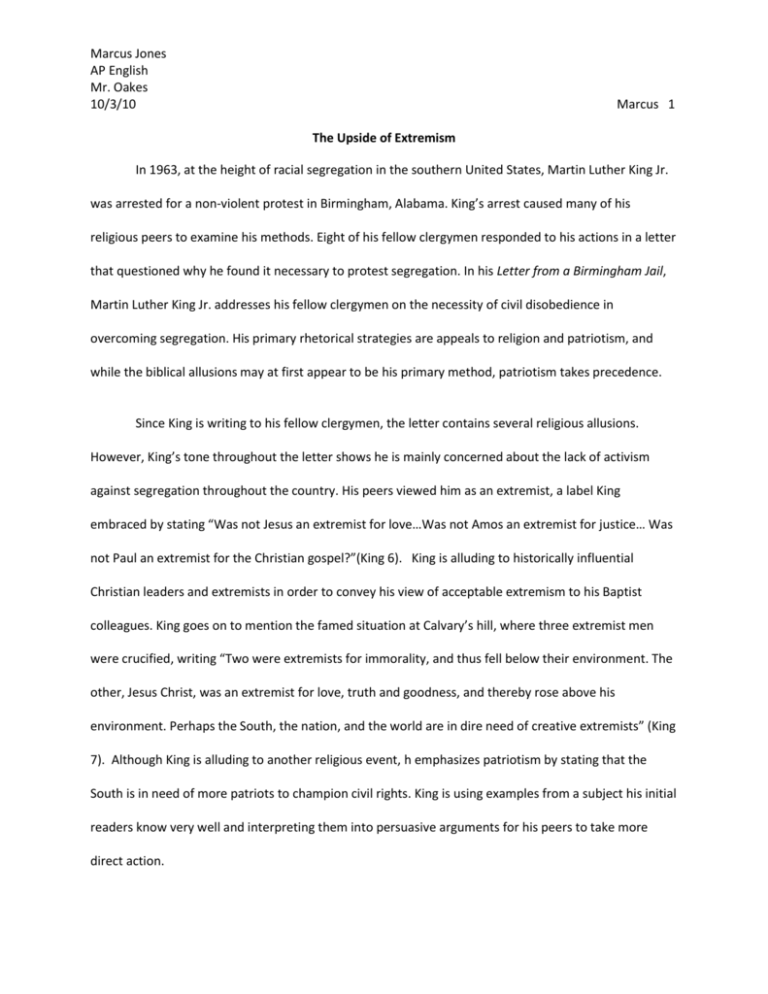
Marcus Jones AP English Mr. Oakes 10/3/10 Marcus 1 The Upside of Extremism In 1963, at the height of racial segregation in the southern United States, Martin Luther King Jr. was arrested for a non-violent protest in Birmingham, Alabama. King’s arrest caused many of his religious peers to examine his methods. Eight of his fellow clergymen responded to his actions in a letter that questioned why he found it necessary to protest segregation. In his Letter from a Birmingham Jail, Martin Luther King Jr. addresses his fellow clergymen on the necessity of civil disobedience in overcoming segregation. His primary rhetorical strategies are appeals to religion and patriotism, and while the biblical allusions may at first appear to be his primary method, patriotism takes precedence. Since King is writing to his fellow clergymen, the letter contains several religious allusions. However, King’s tone throughout the letter shows he is mainly concerned about the lack of activism against segregation throughout the country. His peers viewed him as an extremist, a label King embraced by stating “Was not Jesus an extremist for love…Was not Amos an extremist for justice… Was not Paul an extremist for the Christian gospel?”(King 6). King is alluding to historically influential Christian leaders and extremists in order to convey his view of acceptable extremism to his Baptist colleagues. King goes on to mention the famed situation at Calvary’s hill, where three extremist men were crucified, writing “Two were extremists for immorality, and thus fell below their environment. The other, Jesus Christ, was an extremist for love, truth and goodness, and thereby rose above his environment. Perhaps the South, the nation, and the world are in dire need of creative extremists” (King 7). Although King is alluding to another religious event, h emphasizes patriotism by stating that the South is in need of more patriots to champion civil rights. King is using examples from a subject his initial readers know very well and interpreting them into persuasive arguments for his peers to take more direct action. Marcus Jones AP English Mr. Oakes 10/3/10 Marcus 2 King shows he is not emphasizing religious action when he says “Perhaps I must turn my faith to the inner spiritual church, the church within the church, as the true ekklesia and the hope of the world” (King 8). The “church within the church” specifically references King’s own self morals. King has chosen to make patriotism his emphasis because segregation is an issue that can only be solved through political action. According to King “In any nonviolent campaign there are four basic steps: collection of the facts to determine whether injustices exist; negotiation; self purification; and direct action” (King 1) and since Birmingham had failed the first 3 basic steps, King found it necessary to incite protest with the hope that other churches followed his lead towards a more racially tolerant south. King used the letter as a way of recruitment. King mentions that being a good Christian meant fighting the unjust laws in Birmingham, but his letter shows precedence in his arguments for why civil disobedience is needed. King appeals to a broader audience, beyond just Christians by writing “when you are harried by day and haunted by night by the fact that you are a Negro, living constantly at tiptoe stance, never quite knowing what to expect next, and are plagued with inner fears and outer resentments; when you are forever fighting a degenerating sense of ‘nobodiness’--then you will understand why we find it difficult to wait” (King 3). In his letter, King purposely includes examples and quotes on why direct action against segregation is important to the clergymen so that the letter would transcend Christians and convince all people reading the letter to join his cause. This is also demonstrated when King references other religions like Judaism. When King mentions “It was ‘illegal’ to aid and comfort a Jew in Hitler's Germany. Even so, I am sure that, had I lived in Germany at the time, I would have aided and comforted my Jewish brothers” (King 4). The letter appeals to Jews by referring to them as his “brothers” and the readers connect to the text as if King is speaking directly to them. Marcus Jones AP English Mr. Oakes 10/3/10 Marcus 3 King’s letter is not a religious document; it is a motivational speech on why patriotism is an important part of ending discrimination. Patriotism is love and defense for one’s country, including the people in it. Patriotism is a positive version of extremism that King uses in argument of ending segregation; if one does not support the country’s population as a whole, they do not fully support their country as patriots. Quotes like “One has not only a legal but a moral responsibility to obey laws. Conversely, one has a moral responsibility to disobey unjust laws. I would agree with St, Augustine that ‘an unjust law is no law at all’,” (King 3) show King’s mastery of religious allusions that primarily appeal to his immediate audience, or the eight pastors who wrote him the letter, to convert his fellow clergymen into patriots. King does not intend to give pastors a sermon, but instead shows why being an extremist for ending discrimination is better than waiting for the fall of racial segregation. As King says " ’All Christians know that the colored people will receive equal rights eventually, but it is possible that you are in too great a religious hurry’…Such an attitude stems from a tragic misconception of time, from the strangely irrational notion that there is something in the very flow of time that will inevitably cure all ills. Actually, time itself is neutral; it can be used either destructively or constructively” (King 5). In this case, King’s time is being used constructively because his constant protest against segregation leads to civil rights for blacks in his not-so-distant future.
